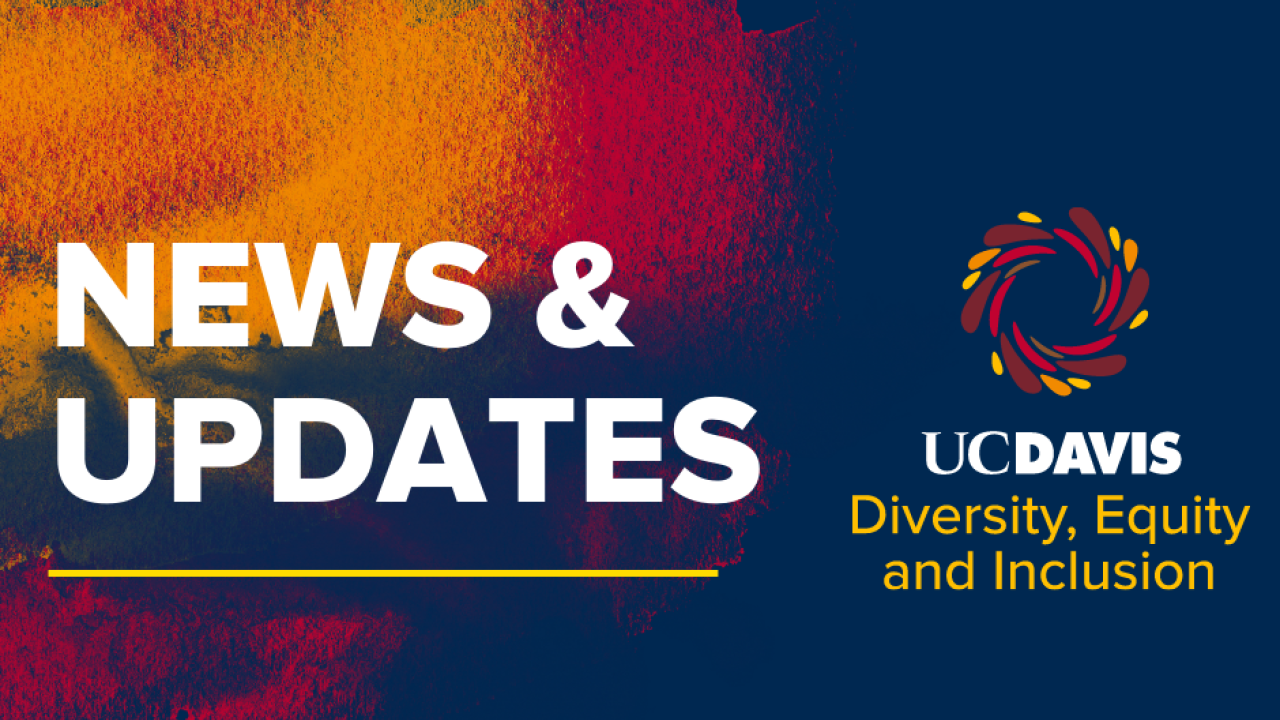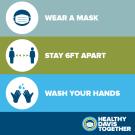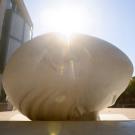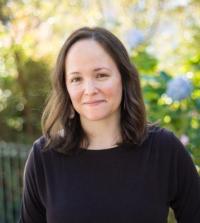
For Your Information | January 13, 2022
Volume 3, Issue 9
Quick Summary
- DEI and Healthy Davis/Yolo Together Initiative Reaches Parents
- P.L.A.C.E. with CAMPSSAH Award Announcements
- Ton recognized by the LA Times for diversity, equity and inclusion efforts
January 13, 2022 | Volume 3, Issue 9
Download a printable version of this week's newsletter
DEI and Healthy Davis/Yolo Together Initiative Reaches Parents

The DEI-HDT Parenting in a Pandemic Initiative produced 11 webinars geared towards parents of the UC Davis community, City of Davis, Yolo County, and beyond. The webinars were facilitated by public health experts to give parents and caregivers accessible, up-to-date, and evidence-based information to help mitigate the spread of Covid. The webinars served underrepresented communities and the diverse population of Yolo County and the greater Sacramento area including but not exclusive to: student parents at UC Davis, African American/Black Youth, and Russian and Spanish language communities. To date, more than 2,000 people attended the live webinars or viewed the recordings on Facebook and YouTube. The most recent webinar, “The Effects of Covid on African American/Black Youth: How to Keep Your Family and Children Safe,” was featured on ABC10. Recordings of the webinars can be accessed on IDEA's webpage.
UC Davis Library Draft Strategic Plan: Call for Comment

A draft of the UC Davis Library’s new DEI-focused, five-year strategic plan is now available for review and comment. Read the draft plan and share your feedback by emailing librarystrategicplanning@ucdavis.edu by January 31, 2022. Learn more.
A MESSAGE FROM VICE CHANCELLOR TULL
Dear Friends,

Happy New Year! I greet you in the middle of our campus-wide pivot, as so many people are working day and night to provide an environment that will be as safe and healthy as possible for everyone in our community. Let me first say thank you to all involved in the “Healthy Davis Together” initiative, including our colleagues at UC Davis Health in Sacramento, and all who are working so diligently to steward the mental and physical health of members of our campus community. This is hard work … thank you!
I was back at the ARC this morning for my regular COVID test, and as usual, the lines were short, there were plenty of appointments available, the staff was on point, and I was in and out in 5 minutes! I took a photo of our testing center this morning and posted it on Twitter … it is a reminder that a lot has been invested in this endeavor (more than 50- stations!) and a lot of thoughtful decisions and careful implementation have gone into making sure that the process is easy and hassle-free for all of us! This is no small feat. You may remember that the New York Times shared our UC Davis story widely when they said, A California University Tries to Shield an Entire City From Coronavirus . The article was published a year ago, but our precautions continue today. When we reflect on what it takes to try to make sure that tens of thousands are safe, I consider how important it has been to have a campus community that is working to make sure that in addition to health and safety which is first and foremost, there is also attention to making sure that people are able to still have basic needs, that employees are still able to have an income to take care of themselves and their families, that there is consideration for the academic needs of the campus community – in the context of progression and career advancement that isn’t stopping and still taking place around the world – despite these abnormal times. All in all, it is a daunting task, but we are UC Davis, and UC Davis has taken this challenge head on!
Here are some resources that may help during this time:
- UC Davis posted a new Q&A today on campus operations for COVID-19: https://www.ucdavis.edu/news/qa-campus-covid-19-operations
- Availability of Masks (in limited supply).
- KN95 or N95 masks are recommended. The campus has a plan for distributing masks to instructors and students who are meeting for class or lab between now and 1/28 (see the link above) – this is based on the available supply.
- Many of the DEI sessions and workshops provided by our office are pivoting to Zoom over the next few weeks, but for the sessions that will be in-person, the DEI office will make KN95 masks available to all participants.
- The Aggie Compass Basic Needs Center on campus will also have a limited supply of masks available for students.
- Students who would like to request accommodation are encouraged to contact the Student Disability Center (see guidelines on this page. )
- Guidance for Winter 2022 from the Academic Senate can be found here: https://campusready.ucdavis.edu/testing-response/winter-quarter, including the need to “have a negative COVID-19 test prior to accessing campus the first time, with the exception of using the testing facilities.”
- Outdoor Vaccination Booster Clinic – open to the entire Davis community: “Tuesday, Jan. 18 and Wednesday, Jan. 19 for students and employees who are eligible to receive a COVID-19 booster. The clinic will be open from 10 a.m.—4 p.m. each day and you may make an appointment via MyTurn.” Read more here.
The campus is not closed, although everyone is remaining as cautious as possible. We see your resilience, and we hear about the strength that you are putting forward daily in these strange times … as you work, study, live, and breathe. It is a struggle, but we remain committed to being in community, and for that I just end with: Thank you.
Warmest Regards,
Renetta
UC Davis Undergraduate Research Program Opportunity
Are you interested in a career that involves research as a scientist or a physician? Wondering what to do this summer? Wanting to get into a lab on campus, but are not sure how to start? In a lab and seeking a way to finance your summer research experience? The UC Davis Educational Enrichment & Outreach Programs (EEOP) is home to five exciting undergraduate programs that support students from marginalized communities who aspire to a career in the life sciences. They have programs that can help you participate in research ranging from neuroscience, aging biology, cancer biology, public health, and other areas of biomedical inquiry. The great news is you only to need complete one easy online application to be considered for any of these programs! Check out our website for details on MARC, ADAR, ADNR, CURE, and our website for PHS. Application deadline is March 24 at 11:59PM.
Library Exhibit: In Memory and Celebration: bell hooks
The prolific and influential poet, social and cultural theorist, and literary critic, bell hooks, passed away on Wednesday, December 15, 2021. Her work and career is influential around the world, informing feminism, black thought, sociology, poetics, and world literature, as well as the path of activists, who set forth to address the challenges and struggles that hooks articulated with percison and intimacy. The UC Library provides access to many of bell hooks’ publications, as well as the enormous literature that has been shaped by her intervention into the study of culture and social life. Reading list here.
UPDATES & ANNOUNCEMENTS
Office of Academic Diversity | AVC Lorena Oropeza
P.L.A.C.E. with CAMPSSAH Award Announcements
2022 Writing Community
The P.L.A.C.E. with CAMPSSAH team, led by Kimberly Nettles-Barcelón (Gender, Sexuality and Women's Studies), is delighted to announce the selection of our second Writing Community cohort. The P.L.A.C.E. Writing Community is a bi-weekly, two-quarter writing support group for social science, arts, and humanities faculty working on a second book-length proposal. The community is facilitated by historian and professional writing consultant, Elena K. Abbott of Ink Blotter. 2022 Writing Community Members:
Desirée A. Martín, English
Un/Translation: Media and Translation in Chicanx/Latinx and Border Culture places Chicana/o, Latina/o and U.S.-Mexico border culture at the center of both American and Mexican intellectual and creative discourse
Susette Min, Asian American Studies
A Host of Possibilities attempts to explore the immigration and security crisis in relation to the concept of hospitality
Bettina Ng'weno, African American and African Studies
Growing Old in a New City, looks at the spatial and temporal structuring of the rapidly changing city of Nairobi
Grace Wang, American Studies
Working on a film project and monograph on the politics of race and music, exploring, in particular, the history of African Americans in the classical orchestral field.
Read the full announcement here.
Scholar of the Quarter | Fall 2021

P.L.A.C.E with CAMPSSAH is delighted to announce the recipient of our fall Scholar of the Quarter award–Jessica Bissett Perea(Dena’ina), Associate Professor and Graduate Advisor in Native American Studies!
The Scholar of the Quarter award is an initiative now in its second year funded by a UC Office of the President “Advancing Faculty Diversity” grant designed to improve faculty retention and satisfaction through peer recognition.
This award is designed to recognize faculty at the assistant or associate rank whose scholarship epitomizes scholarly or creative achievements that involve diverse communities with a commitment to social change.
Read the full announcement here.
Office of Campus Community Relations | Interim AVC Mikael Villalobos
UC Davis Book Project: Social Justice Bibliography
The UC Davis Campus Community Book Project is excited to share our Social Justice Bibliography, which explores different aspects of this year’s book project theme and provides links to entries in the UC Davis Library Discovery System. Enormous thanks to Matt Conner, Student Services Librarian, for curating this bibliography.
In its twentieth year, the Campus Community Book Project in 2021-2022 focuses on the theme of social justice in practice and features How to Be an Antiracist by Ibram X. Kendi. Visit the book project events page and subscribe to our online calendar for up-to-date event information and registration links. We also invite you to follow the book project on Facebook, Twitter, Instagram, and YouTube.
Office of Health Equity, Diversity and Inclusion | AVC Hendry Ton
Hendry Ton recognized by the LA Times for diversity, equity and inclusion efforts
UC Davis Health Associate Vice Chancellor for Health Equity, Diversity and Inclusion Hendry Ton was recognized in the LA Times Business Publication for his dedication to advancing diversity, equity, inclusion, and anti-racism initiatives within the health system and the larger community. He joined a list of reader-nominated inspirational, diverse leaders exhibiting achievements within their respective businesses. Read the summary here.
Deans’ 2021-2022 Award for Excellence
Nominations are now being sought for the 2021-2022 Deans' Awards for Excellence. The purpose of these awards is to reward the outstanding achievements of our School of Medicine and Betty Irene Moore School of Nursing faculty and teams, and to acknowledge their contributions in our community. Each nominee or team’s dedication to one of our mission areas is a focused and compelling example that exemplifies and aligns our community with our mission of providing excellent patient care, conducting groundbreaking research, fostering innovative, interprofessional education, and creating dynamic, productive partnerships with the community. Each nominee’s efforts must clearly contribute to UC Davis Health being a destination of choice to all we serve. The deadline for all nominations is Monday, February 28, 2022. Visit the award pages listed below for full details and nomination instructions. Each award includes a monetary award and all awardees will be recognized in May, 2022.
- Deans’ Award for Excellence
- Deans’ Award for Excellence in Equity, Diversity and Inclusion–Faculty Member
- Deans’ Award for Excellence in Mentoring
- Deans’ Team Award for Excellence
- Deans’ Team Award for Inclusion Excellence
EVENTS
January 13, Thursday
Refugee Health: Empowering Clinicians Caring for Afghan Refugees | 12:00pm
A training for providers working with Afghan refugees in Sacramento. Dr. Farah Shaheen is a primary care internist who provides care for the medically underserved, which includes our undocumented immigrants and refugee population. Dr. Carolee Tran is an Assistant Clinical Professor at UC Davis in the department of psychiatry and is the first Vietnamese woman to become a clinical psychologist in America. Khoban Kochai serves as the Assistant Director for Anchor Institution and Culture/Climate. She has more than 15 years of experience in health care management and health equity advocacy and has held positions in nonprofit and academic organizations, both domestically and abroad. Learn more and register here.
“Towards a Culture of Servingness: How the UCs Embrace their Past, Present, and Future as an HSI System” | 2:00pm
The University of California (UC-HSI) Hispanic-Serving Initiative is thrilled to announce the upcoming publication of the inaugural UC HSI Initiative Research and Practice Brief Series! The series will feature three research and practice briefs written by thought and practice leaders in the UC community. To celebrate the launch, we invite you to join our upcoming webinar that will feature an engaging discussion with our brief series’ authors where they will share innovative practices and impactful research happening across the UC system as it relates to the UC’s status as a Hispanic Serving Research Institutions (HSRI) system. Register here.
January 14, Friday
Team Research Forum: COVID-19 and the Omicron Variant | 12:00pm
We will be hosting an open Q&A session focused on the most recent developments around COVID-19 and the Omicron variant in our community. Speakers include: Dr. Richard Michelmore, Distinguished Professor and Director of Genome Center, Novozymes Endowed Chair in Genomics; Dr. Bradley H. Pollock, Distinguished Professor of Epidemiology and Chairman, Arline Miller Rolkin Chair in Public Health Sciences, Department of Public Health Sciences, Associate Dean for Public Health Sciences, School of Medicine; Dr. Stuart Cohen, Professor and Chief, Division of Infectious Diseases, Medical Director, Department of Epidemiology and Infection Control. This event is open to UC Davis faculty, researchers, student and staff only. Register here.
January 19, Wednesday
Racial Justice Speaker Series Presents Maryam Jamshidi, “Political Accountability for Discrimination in National Security” | 12:15pm
This talk examines the prospects for regular people to hold the government politically accountable for national security policies that undermine civil rights. In particular, it looks at how the rule of law impacts (and sometimes undermines) these political accountability efforts, including for national security programs that are facially neutral but disproportionately impact people of color, as well as programs that are explicitly discriminatory. This talk explores ways the law can better support grassroots efforts to politically check the government for national security policies threatening the interests and rights of people of color. Learn more and register.
Healing Circle - In Light of Dr. King’s Transformative Impact On Our World | 6:00pm
Join the UC Davis Health Office for Health Equity, Diversity and Inclusion for our virtual healing circle, facilitated by: Mercedes Piedra, MS: Director of Healing Centered Education for UCDH Office for Health Equity, Diversity & Inclusion; Rangineh Azimzadeh Tosang, MA, CPF: Founder of Solh Resolutions International. Welcome to Virtual Healing Circles! In the spirit of Dr. Martin Luther King Jr.’s transformative impact, we invite you to join us in a session of compassionate listening and intentional sharing to connect us to our collective humanity. Register here.
January 20, Thursday
Staff/Faculty Womxn of Color Support Group | 12:00pm
This group was brought together in 2019 by Dr. Satinder Gill and Cecily Nelson-Alford to support womxn of color employed at UC Davis. The intention is to offer a safe and encouraging space to support healing, growth and development in the personal and professional lives of womxn of color. Hosts: Dr. Satinder Gill, Licensed Clinical Psychologist, Academic and Staff Assistance Program Cecily Nelson-Alford, Director, Women’s Resources and Research Center. Consent for participation is necessary, please contact drgill@ucdavis.edu for more information. The groups meets bi-weekly year round on Thursday (next meeting 2/3).
Growing as a Community: Racism as a Public Health Crisis | 12:00pm
Discussion hosted by Sacramento leaders and featuring a short screening of Cooked: Survival By Zip Code. Featured guests: DeAngelo Mack, Director of State Policy, Public Health Advocates; Katie Valenzuela, District 4 Councilmember, City of Sacramento; Mai Vang, District 8 Councilmember, City of Sacramento; Judith Helfand, Director/Producer/Educator, Cooked: Survival by Zip Code; Mercedes Piedra, Director of Healing Centered Education for the Office of Health Equity, Diversity and Inclusion at UC Davis Health. For more information about the film, please go to: www.cookedthefilm.com. Register here.
The UC Davis Forums Presents Stella Flores, “Latinx Identity Educational Pipeline Stories: Barriers and Successes from State Policy | 3:00pm
While Latinos have seen an increase in college enrollment over the last decade, completion rates are stagnant or declining. As a result, there is a widening gap between this group and non-Hispanic whites in the attainment of college degrees. This presentation will highlight research related to Latinos’ college success, emphasizing the promise of Latino-attentive approaches for boosting college completion. Learn more and register here.
February 3, Thursday
Staff/Faculty Womxn of Color Support Group | 12:00pm
This group was brought together in 2019 by Dr. Satinder Gill and Cecily Nelson-Alford to support womxn of color employed at UC Davis. The intention is to offer a safe and encouraging space to support healing, growth and development in the personal and professional lives of womxn of color. Hosts: Dr. Satinder Gill, Licensed Clinical Psychologist, Academic and Staff Assistance Program Cecily Nelson-Alford, Director, Women’s Resources and Research Center. Consent for participation is necessary, please contact drgill@ucdavis.edu for more information. The groups meets bi-weekly year round on Thursday (next meeting 2/3).
February 10, Thursday
Global Migration Center Presents “Beyond Social Death: Migrant Ontologies in the Digital Narrative” | 12:00pm
Brooke Kipling theorizes a digital narrative of a Honduran migrant. Kipling illuminates possibilities of migrant being and world-making that exist outside of narrative frameworks that center migrant pain and suffering within a timeline of repair, where experiences of racialized violence dissipate through the promise of inclusion. Kipling thinks with and through theorizations of the flesh and its ontological possibilities that emerge from Black studies to consider how Central American migrants articulate other ontological possibilities from the site of their disposable existence. Learn more and find Zoom link here.
February 11, Friday
Community-Academic Partnerships to Advance Equity-Focused Climate Action | 10:00am
You are invited to attend an Introductory Workshop for a new year-long training called CAPECA. CAPECA aims to augment the training of ten Californian place-based teams of community leaders and university researchers from the UC and CSU who work together to draw on participatory methods to ask and answer key research questions that inform climate planning and action in their place. The training will be rooted in the principles and practices of participatory action research, popular education, and social equity. Learn lots more and register here.
February 15, Tuesday
Aoki Presents Lorena V. Marquez Book Talk - La Gente | 12:00pm
La Gente traces the rise of the Chicana/o Movement in Sacramento and the role of everyday people in galvanizing a collective to seek lasting and transformative change during the 1960s and 1970s. In their efforts to be self-determined, la gente contested multiple forms of oppression at school, at work sites, and in their communities. Márquez shows that the Chicana/o Movement was not solely limited to a handful of organizations or charismatic leaders. Rather, it encouraged those that were the most marginalized—the working poor, immigrants and/or the undocumented, and the undereducated—to fight for their rights on the premise that they too were contributing and deserving members of society. Learn more here. Register in advance for this event.
February 17, Thursday
Global Migration Center Presents “Precarious Legal Patchworking: Detained Immigrants’ Access to Justice” | 12:00pm
As immigration enforcement increases, so does the detention of immigrants facing the threat of deportation. Detained without the support of a public defender system – a feature of US immigration law, immigrants face a complex immigration court that is adversarial and can produce dire consequences including family and community exile, loss of employment, and inevitable violence or even death if deported. This paper chronicles the experiences of former detainees and how they were able to acquire (or not acquire) justice through multiple means while detained. Learn more and find Zoom link here.
RECOMMENDED READING
Lisa E. Johnson (PhD candidate, UC Davis), et al., "Poverty Associated with Stress Among California Adolescents of Mexican Origin," Center for Poverty and Inequality Research, January 2022.
In a new policy brief, Lisa Johnson and her co-authors suggest that efforts to increase family income may promote healthy stress regulation among youths growing up in the most impoverished circumstances. Persistent poverty can jeopardize adolescent well-being, with fluctuations in family income also affecting development, particularly in low-income environments. In a study of 229 Mexican-origin teens, participants who experienced poverty throughout their adolescence displayed atypically low stress responses. Public policy programs that help alleviate poverty may improve psychological and physical health among adolescents. Download the new policy brief.
Responses to 10 Common Criticisms of Anti-Racism Action in STEM
While observing and participating in recent discussions about the racism that pervades institutions, departments, and scientific discourse, we (the coauthors) observed a set of standard arguments levied against anti-racism action within STEM (Science, Technology, Engineering, and Mathematics). This document began as a repository for scholarly literature surrounding the experiences of BIPOC (defined below) in STEM, but has evolved into a more formalized, evidence-based reference and website. The goal of this document is to facilitate more productive conversations (and in turn, tangible systemic changes) toward addressing racial discrimination within STEM. Download the document here.
ADDITIONAL RESOURCES
ADDITIONAL RESOURCES
[NEW] Resources for Trans and Non-Binary Employees
UC Davis is committed to supporting trans and non-binary employees in the workplace. Resources for employees; resources for supervisors; policies and laws; health benefits; reporting options; community and individual support. Find the resources here.
11 Suggested Actions toward Anti-Racism in the Office and on Your Own
Written by the UC Davis Office of the Vice Chancellor for Diversity, Equity and Inclusion and based on the Office of Health Equity, Diversity and Inclusion’s Anti-Racism and DEI Action Plan, the “Being an Ally Requires being Anti-Racist: 11 Suggested Actions toward Anti-Racism in the Office and on Your Own” provides practical suggestions for everyone.
Reporting Concerns of Harassment and Discrimination
The Harassment & Discrimination Assistance and Prevention Program (HDAPP) supports the University's commitment to a harassment and discrimination-free work and learning environment for all members of the UC Davis, UC Davis Health, and University of California Agriculture and Natural Resources (ANR).
If you are interested in reporting concerns of Harassment and Discrimination, please contact HDAPP to file a report and/or speak with a representative to better understand your options. Learn more about HDAPP here or go to HDAPP's website for more information.
11 Suggested Actions toward Anti-Racism in the Office and on Your Own
Written by the UC Davis Office of the Vice Chancellor for Diversity, Equity and Inclusion and based on the Office of Health Equity, Diversity and Inclusion’s Anti-Racism and DEI Action Plan, the “Being an Ally Requires being Anti-Racist: 11 Suggested Actions toward Anti-Racism in the Office and on Your Own” provides practical suggestions for everyone.
Aggie Compass Basic Needs Center
The mission of Aggie Compass is to help mitigate the effects of food and housing insecurity on students, while working to change policy, systems and environment that will affect long term change. The Aggie Compass is a comfortable space for students to build community and learn about basic needs resources, pick up fresh fruits and vegetables, receive CalFresh enrollment assistance and help finding stable housing.
If you need help with food or housing insecurity concerns, financial or mental wellness, please visit their website for more information.
Counseling Services Mental Health Resources Webinar [requires Kerberos log-in] One of the things we hear frequently from instructors about teaching in Spring 2020 is the extent to which they encountered students in their courses experiencing significant stress or crisis, yet they felt unequipped to help or direct students to resources. To help, Student Health and Counseling Servicesprovided a Mental Health Resources Webinar. If supporting students in crisis is a concern for you, please watch this previously-recorded webinar. Webinar topics include an overview of mental health services on campus, how to make referrals, signs of distress and how to respond, and how faculty can support students in the classroom (remote or on-campus). Student Affairs has also provided this folder of faculty resources.
Content Submission Form
Do you have a DEI-oriented event, announcement, or article that you would like us to help promote through our DEI communication channels? Did your unit/department or a member of your unit/department receive recognition that demonstrates your commitment to DEI? If so, please send us your information through this online form.
We invite you to share and submit your thoughts and items for our newsletter (either current or future news and events) at diversityinclusion@ucdavis.edu
Thank you for your dedication to diversity, equity and inclusion!
